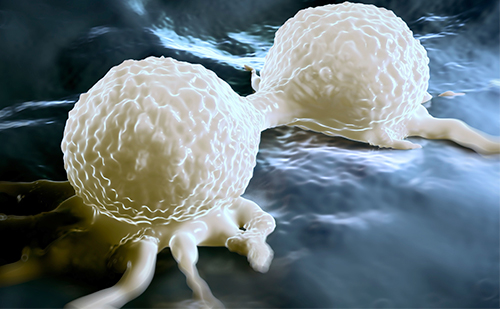
Researchers from the Johns Hopkins Kimmel Cancer Center and Bloomberg Kimmel Institute for Cancer Immunotherapy using a mouse model found that a microbe commonly associated with colitis and colon cancer may play a role in the development of some breast cancers.
“Existence of distinct breast microbiota has been recently established but their biological impact in breast cancer remains elusive. Focusing on the shift in microbial community composition in diseased breast compared to normal breast, we identified the presence of Bacteroides fragilis in the cancerous breast. Mammary gland as well as gut-colonization with enterotoxigenic Bacteroides fragilis (ETBF), that secretes B. fragilis toxin (BFT), rapidly induces epithelial hyperplasia in the mammary gland,” the researchers wrote.
Their findings were published in the journal Cancer Discovery in a paper titled, “A pro-carcinogenic colon microbe promotes breast tumorigenesis and metastatic progression and concomitantly activates Notch and βcatenin axes.”
The researchers observed that when ETBF was introduced to the gut or breast ducts of mice, it always induced growth and metastatic progression of tumor cells.
While microbes are known to be present in body sites such as the gastrointestinal tract, nasal passages, and skin, breast tissue was considered sterile until recently, said senior study author Dipali Sharma, Ph.D., a professor of oncology at Johns Hopkins Medicine.
“Our study suggests another risk factor, which is the microbiome. If your microbiome is perturbed, or if you harbor toxigenic microbes with oncogenic function, that could be considered an additional risk factor for breast cancer.”
The researchers performed a meta-analysis of clinical data looking at published studies comparing microbial composition among benign and malignant breast tumors of breast cancer survivors and healthy volunteers, and found that B. fragilis was detected in all breast tissue samples as well as the nipple fluids of cancer survivors.
The team gave the ETBF bacteria by mouth to a group of mice. First, it colonized the gut. Within three weeks, the mouse mammary tissue had changes usually present in ductal hyperplasia, a precancerous condition.
The researchers also discovered hyperplasia-like symptoms appeared within two to three weeks of injecting ETBF bacteria directly to the teats of mice. Cells that were exposed to the toxin exhibited more rapid tumor progression and developed more aggressive tumors than cells not exposed to the toxin. The breast cancer cells that were exposed retained a memory of the toxin, and were able to start cancer development. Investigators also observed the Notch1 and beta-catenin cell signaling pathways to be involved in promoting EBFT’s role in breast tissue.
Additional studies are needed to see how ETBF moves throughout the body, and to determine whether ETBF is a direct driver in triggering the transformation of breast cells in humans.
Looking ahead, the lead author suggests adding screening for microbiome changes.”This is just one indicator, and we think there will be multiple,” Sheetal Parida, a postdoctoral fellow at Johns Hopkins Medicine said. “If we find additional bacteria responsible for cancer development, we can easily look at the stool and check for those. Women at high risk of developing breast cancer might have a high population of some of these.”













